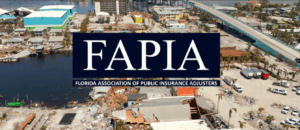At least six property insurers in Florida have opened a new front in their battle against public claims adjusters – policy endorsements that strongly discourage property owners’ use of public adjusters altogether.
And the National Association of Public Insurance Adjusters and the Florida Association of Public Insurance Adjusters have filed suit, contending that some of the endorsements are not allowed under Florida statutes.
“They’re unfair to the people who are working for the insureds, and they’re illegal,” Jonathan Zachem, general counsel for FAPIA, said at the group’s conference this week in Orlando. “It’s a clear case of antitrust and unfair trade practices.”
Zachem was talking about endorsements now included in some excess and surplus policies offered by Velocity Risk Underwriters, a managing general agent for Interstate Fire and Casualty and for Lloyd’s of London, among others.
Surplus lines insurers are only lightly regulated by Florida statues and rules, and Velocity can offer these endorsements that all but bar public adjusters in claims handling. But four admitted Florida carriers also recently filed for similar but optional endorsements. American Integrity Insurance, Orange Insurance Exchange, Safe Harbor Insurance and US Coastal Property and Casualty Insurance Co. all have asked the Florida Office of Insurance Regulation to approve forms that grant premium discounts if policyholders agree to avoid the use of public adjusters, an OIR spokesperson said.
“These endorsements allow policyholders to choose whether or not they would like to use a public adjuster in the event of a claim, for a discount on their premium,” OIR Press Secretary Shiloh Elliott said in an email.
Adjusters and FAPIA leaders expect that similar restrictions will eventually be adopted by other Florida property insurers.
It’s the latest offensive by carriers hoping to muscle public adjusters out of the claims picture. Some insurers and their advocates have long argued that public adjusters, whose fee is a percentage of the insurance payment, can exaggerate the estimated cost of repairs. In June, Florida’s largest carrier, Citizens Property Insurance Corp., adopted a new policy that could have an indirect impact: Claims settlement checks no longer include the name of the public adjuster.
Some carriers have taken other tactics that shift burdens on to insureds and limit payouts, Outgoing FAPIA President Juan Moya said at the conference. These include endorsements by at least four carriers that seek to minimize payments on water-leak losses and restrict payouts on matching materials, such as floor tile, to no more than 1% of the total area covered by that material.
Last week, a Florida appeals court added another hurdle for insureds and public adjusters: requiring actual cash value estimates before policyholders can file suit for breach of contract by insurers, plaintiffs’ attorneys said.
 Public adjusters are pushing back. FAPIA recently sent a letter to Citizens’ leaders, urging them to rescind the “dangerous new policy” that excludes public adjusters from being named on insurance settlement checks.
Public adjusters are pushing back. FAPIA recently sent a letter to Citizens’ leaders, urging them to rescind the “dangerous new policy” that excludes public adjusters from being named on insurance settlement checks.
The Velocity lawsuit by FAPIA and NAPIA, filed in Miami-Dade Circuit Court, contends that anti-public-adjuster endorsements fundamentally violate adjusters’ and insureds’ statutory rights.
The endorsement language is straightforward:
“It is understood and agreed that a condition of this policy is that the named insured shall not hire, engage, retain, contract with, or otherwise utilize the services of a public adjuster, whether or not licensed in the state where the property is located or any other jurisdiction to inspect, evaluate, or adjust any loss covered by this policy,” reads the endorsement in a policy provided by Velocity Risk Underwriters, according to the lawsuit complaint.
“Velocity also threatens that it will not take any steps to investigate, and it does not investigate, the insured’s loss until the insured provides evidence that it has withdrawn from any representation by a Public Adjuster,” the complaint contends. “This requirement is plainly coercive for the insured after a loss, when time and attention to the loss is required right away.”
Some public adjusters in Florida have already been forced to terminate their representations of property owners because of the Velocity endorsement, the suit contends.
Chip Merlin, a plaintiffs’ attorney who spoke at the FAPIA conference this week, said the endorsements raise new questions about unregulated surplus lines’ free rein to limit coverage.
“It doesn’t have to be that way,” Merlin said. “State regulators need to look at more financial regulations for surplus lines.”
Officials with Velocity Risk Underwriters, owned by the Ryan Specialty brokerage since February, could not be reached about the FAPIA lawsuit.
Was this article valuable?
Here are more articles you may enjoy.


 Insurance Broker Stocks Sink as AI App Sparks Disruption Fears
Insurance Broker Stocks Sink as AI App Sparks Disruption Fears  Judge Awards Applied Systems Preliminary Injunction Against Comulate
Judge Awards Applied Systems Preliminary Injunction Against Comulate  Florida Engineers: Winds Under 110 mph Simply Do Not Damage Concrete Tiles
Florida Engineers: Winds Under 110 mph Simply Do Not Damage Concrete Tiles  World’s Growing Civil Unrest Has an Insurance Sting
World’s Growing Civil Unrest Has an Insurance Sting 


